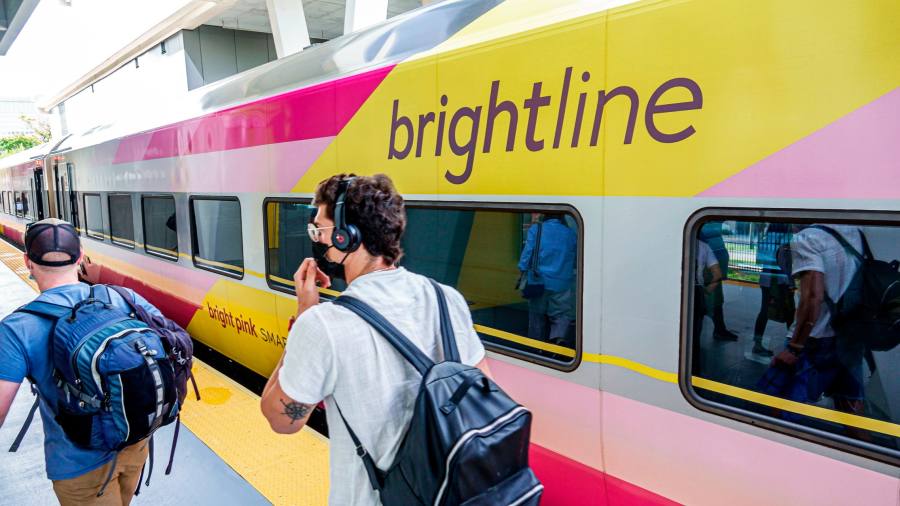Receive free Virgin Group Ltd updates
We’ll send you a myFT Daily Digest email rounding up the latest Virgin Group Ltd news every morning.
Sir Richard Branson’s Virgin Group was heading for a “brand catastrophe” as a result of difficulties it encountered during the coronavirus pandemic, according to an internal company email cited in a $250mn lawsuit that began on Monday.
The value of one of Britain’s best-known brands — whose logo has adorned banks, record shops and even spacecraft — is at the centre of legal action that Virgin is taking in London’s High Court against a former business partner in the US, the train operator Brightline.
Brightline, owned by Fortress Investment Group, had struck a 20-year deal with the UK-based group in 2018 to rebrand its service in Florida, and a planned route from Las Vegas to southern California, as Virgin Trains USA.
However, the US company abandoned the tie-up less than two years later, arguing that an exit clause in the contract was triggered because the brand Branson established in the early 1970s had lost its “international high repute”.
Brightline claimed some of Virgin’s own employees appeared to agree with this assessment. In documents filed with the court on Monday, it cited internal company communications in which its staff discussed how to manage various reputational problems.
These included public criticism of Virgin Atlantic during the pandemic, when it requested bailout funds from the UK government and asked staff to take unpaid leave, while Branson was living in a tax haven.
“We are sleepwalking into a brand catastrophe,” read one email from Greg Rose, Virgin’s content and communications director.
Patrick McCall, senior partner at Virgin Group at the time, also warned that Virgin Atlantic’s difficulties were a “reputation nightmare”. “Tax residency is a reputation killer,” he wrote.
Virgin, which argues Brightline is in breach of a trademark licensing agreement, said in its lawsuit that the US company’s claims were “cynical and spurious”.
The UK-based group said Brightline was “looking for an opportunistic pretext to extricate itself” because it had “second thoughts about the deal”. It is seeking about $250mn in damages.
Licensing agreements such as the one Virgin struck with Brightline have been core to Branson’s business model for years, allowing him to build a diverse global group while putting comparatively little of his own money at risk.
The court filings offer a glimpse into how Branson pitches the value of his brand to potential partners, describing a dinner between the entrepreneur and Fortress co-founder Wes Edens at which the Virgin team said its brand could boost Brightline’s revenues by 10 per cent and allow the train operator to raise fares.
Brightline, in its defence, also cited other problems in the wider group of Virgin companies, including disqualification in 2019 from bidding for a renewal of the West Coast mainline train franchise in the UK.
In its lawsuit, Virgin accepted that it faced “challenges” during the early stages of the pandemic, but that these were “addressed”. It said that despite intense public criticism at the time in the UK, there was “no notable negative press” concerning the brand in the US.
Daniel Toledano KC, representing Virgin, told the court on Monday that Brightline had to demonstrate more than just a “temporary blip” in Virgin’s reputation.
Virgin added: “The Virgin brand has been a symbol of global innovation and entrepreneurship for more than 50 years.
“While litigation is never our preferred option, our case against Brightline seeks to uphold our contractual rights and protect our brand following Brightline’s attempts to breach our long-term licensing agreement.”
The trial, overseen by Judge Mark Pelling in central London, is expected to last about three weeks.
Fortress was sold in May by SoftBank to an arm of Abu Dhabi’s sovereign wealth fund and the asset manager’s own employees.
Read the full article here




